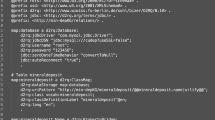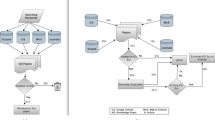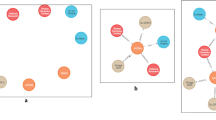Abstract
Large-scale disasters pose significant response challenges for all governmental organizations and the general public. Several difficulties usually occur during the response efforts, making it important for the authorities to take timely key decisions to mitigate and recover from disastrous or emergency situations. We herein present an ontology-supported hybrid reasoning model by integrating case-based reasoning and rule-based reasoning with implementation support for decision-makers to effectively respond in case of emergencies. We also introduce a new hierarchically organized semantic knowledge representation model to represent the case base structure that enhances case-based reasoning to knowledge-intensive case-based reasoning. In addition, we obtain experimental results on the analysis of the proposed approach in terms of the efficiency of the decision support system. Hence, it seems reasonable to merge the advantages of both approaches using a hybrid model of knowledge representation. The model output presents an estimation of the number of resources to be deployed if an emergency occurs. The proposed approaches for both the knowledge representation structure and the inference algorithm have proved to improve the accuracy of recommendation in emergencies. The results show that our hybrid system approach is efficient in decision support. The ontology-supported hybrid reasoning approach is also further validated using subjective evaluation.







Similar content being viewed by others
Change history
20 August 2020
There are incorrect data in the body and the original article is corrected.
References
Jain S, Mehla S, Mishra S (2016) An ontology of natural disasters with exceptions. In: 2016 International Conference System Modeling & Advancement in Research Trends (SMART). IEEE, pp 232–237
Jain S, Mehla S, Agarwal AG (2018) An ontology based earthquake recommendation system. In: International Conference on Advanced Informatics for Computing Research. Springer, Singapore, pp 331–340
Mehla S, Jain S (2019) Rule languages for the semantic web. In: Emerging Technologies in Data Mining and Information Security. Springer, Singapore, pp 825–834
Honeywell : https://instantalert.honeywell.com/
MissionMode: http://www.missionmode.com
ENSEMBLE: http://ensemble2.jrc.ec.europa.eu/ Web
Command Caller: http://www.voicetech.com/Command_Caller_40.htm
Sahana: http://www.sahana.lk/
Sigame: http://www.sigame.es/
Geldermann J, Bertsch V, Treitz M, French S, Papamichail KN, Hämäläinen RP (2009) Multi-criteria decision support and evaluation of strategies for nuclear remediation management. Omega 37(1):238–251
Ortuño MT, Tirado G, Vitoriano B (2011) A lexicographical goal programming based decision support system for logistics of humanitarian aid. Top 19(2):464–479
Shan S, Wang L, Li L, Chen Y (2012) An emergency response decision support system framework for application in e-government. Inf Technol Manag 13(4):411–427
Xanthopoulos AS, Koulouriotis DE (2013) A multi-agent based framework for vehicle routing in relief delivery systems. In: Humanitarian and Relief Logistics. Springer, New York, pp 167–182
Papadopoulos H, Korakis A (2018) Predicting medical resources required to be dispatched after earthquake and flood, using historical data and machine learning techniques: the COncORDE emergency medical service use case. Int J Interact Commun Syst Technol 8(2):13–35
Florez JV, Lauras M, Okongwu U, Dupont L (2015) A decision support system for robust humanitarian facility location. Eng Appl Artif Intell 46:326–335
Lin TN (2018) Research on water levels prediction for disaster management using machine learning models. Doctoral dissertation, Waseda University
Slam N, Wang W, Xue G, Wang P (2015) A framework with reasoning capabilities for crisis response decision–support systems. Eng Appl Artif Intell 46:346–353
Liu W (2013) Discussion on Enterprise emergency management decision support system. In: Intelligence Computation and Evolutionary Computation. Springer, Berlin, Heidelberg, pp 73–77
Fertier A, Barthe-Delanoë AM, Montarnal A, Truptil S, Bénaben F (2020) A new emergency decision support system: the automatic interpretation and contextualisation of events to model a crisis situation in real-time. Decis Support Syst 113260
Li X, Liu G, Ling A, Zhan J, An N, Li L, Sha Y (2008) Building a practical ontology for emergency response systems. In 2008 international conference on computer science and software engineering (Vol. 4, pp. 222-225). IEEE
Masuwa-Morgan KR, Burrell P (2004) Justification of the need for an ontology for accessibility requirements (theoretic framework). Interact Comput 16(3):523–555
Malizia A, Onorati T, Diaz P, Aedo I, Astorga-Paliza F (2010) SEMA4A: An ontology for emergency notification systems accessibility. Expert Syst Appl 37(4):3380–3391
Onorati T, Malizia A, Diaz P, Aedo I (2014) Modeling an ontology on accessible evacuation routes for emergencies. Expert Syst Appl 41(16):7124–7134
Han Y, Xu W (2015) An ontology-oriented decision support system for emergency management based on information fusion. In: Proceedings of the 1st ACM SIGSPATIAL International Workshop on the Use of GIS in Emergency Management, pp 1–8
Amailef K, Lu J (2013) Ontology-supported case-based reasoning approach for intelligent m-government emergency response services. Decis Support Syst 55(1):79–97
Wu Y, Li C (2009) Semantic web-based seismic disaster management expert system. In: 2009 International Conference on Computational Intelligence and Software Engineering. IEEE, pp 1–4
Bai-shang Z, Xiang-yang L, Jun L (2013) Research on emergency case ontology model based on ABC ontology. In: 2013 International Conference on Management Science and Engineering 20th Annual Conference Proceedings. IEEE, pp 227–233
Moehrle S (2012) Generic self-learning decision support system for large-scale disasters. In: Proceedings of the 9th International Conference on Information Systems for Crisis Response and Management
Xu J, Nyerges TL, Nie G (2014) Modeling and representation for earthquake emergency response knowledge: perspective for working with geo-ontology. Int J Geogr Inf Sci 28(1):185–205
Zhang F, Zhong S, Yao S, Wang C, Huang Q (2016) Ontology-based representation of meteorological disaster system and its application in emergency management. Kybernetes 45:798–814
Sahebjamnia N, Torabi SA, Mansouri SA (2017) A hybrid decision support system for managing humanitarian relief chains. Decis Support Syst 95:12–26
Phengsuwan J, Shah T, James P, Thakker D, Barr S, Ranjan R (2020) Ontology-based discovery of time-series data sources for landslide early warning system. Computing 102(3):745–763
Dhakal S, Zhang L (2019) Ontology-based semantic modeling of disaster resilient construction operations: towards a knowledge-based decision support system. In: Advances in Informatics and Computing in Civil and Construction Engineering. Springer, Cham, pp 789–796
Aziz A, Ahmed S, Khan FI (2019) An ontology-based methodology for hazard identification and causation analysis. Process Saf Environ Prot 123:87–98
Jain S (2018) Intelligent decision support for unconventional emergencies. In: Exploring Intelligent Decision Support Systems. Springer, Cham, pp 199–219
Mehla S, Jain S (2019) Development and evaluation of knowledge treasure for emergency situation awareness. Int J Comput Appl:1–11
Jain S, Jain NK, Goel CK (2009) Reasoning in EHCPRs system. Int J Open Probl Comput Math 2(2)
Author information
Authors and Affiliations
Corresponding author
Additional information
Publisher’s note
Springer Nature remains neutral with regard to jurisdictional claims in published maps and institutional affiliations.
Rights and permissions
About this article
Cite this article
Mehla, S., Jain, S. An ontology supported hybrid approach for recommendation in emergency situations. Ann. Telecommun. 75, 421–435 (2020). https://doi.org/10.1007/s12243-020-00786-z
Received:
Accepted:
Published:
Issue Date:
DOI: https://doi.org/10.1007/s12243-020-00786-z




